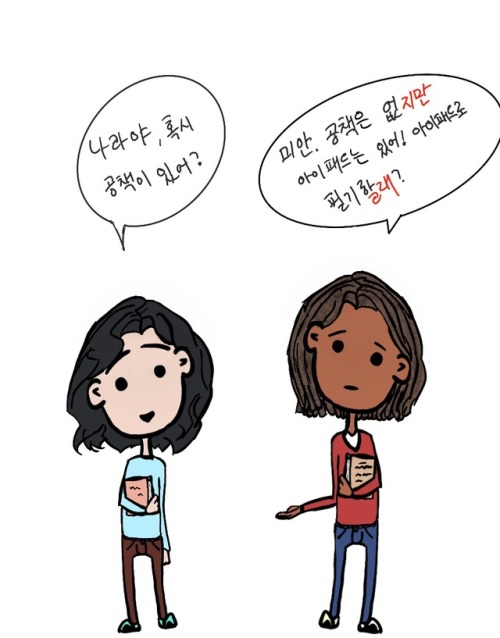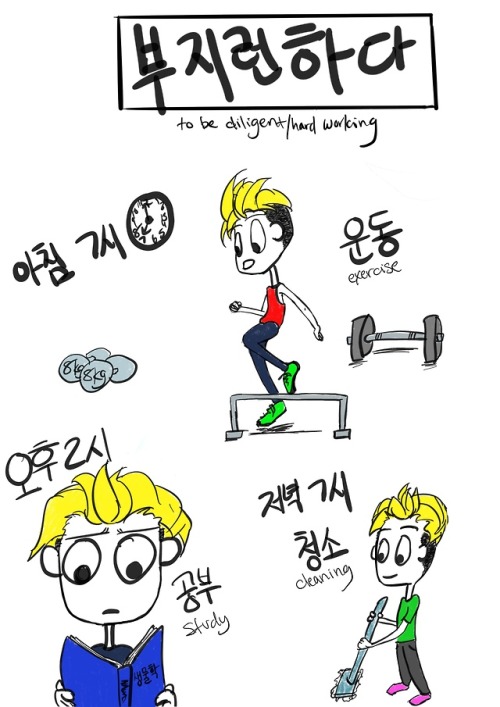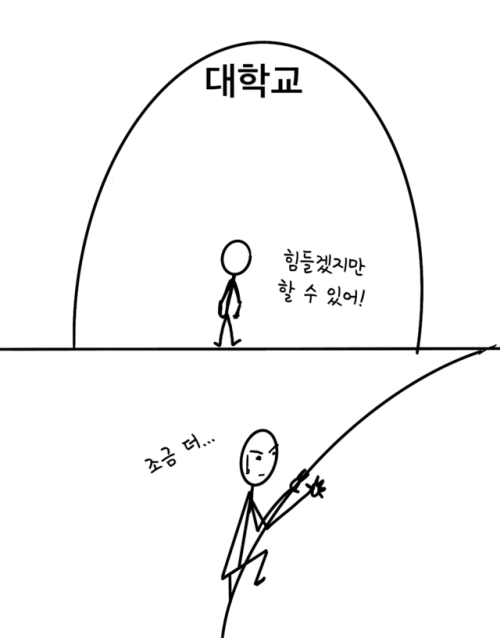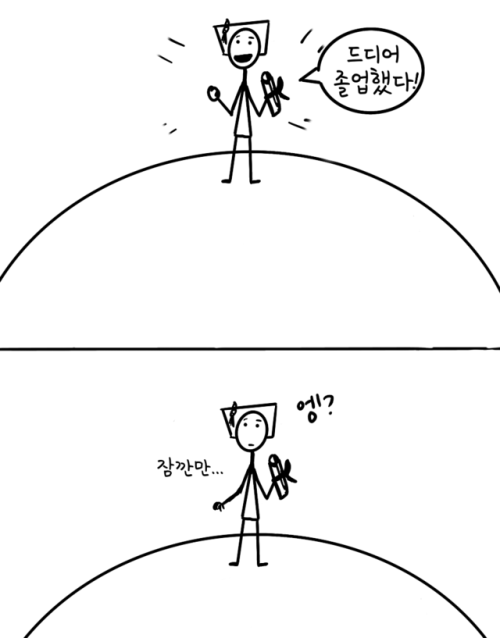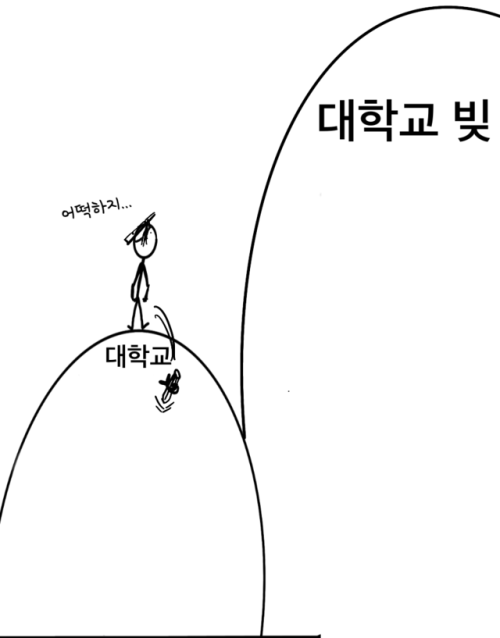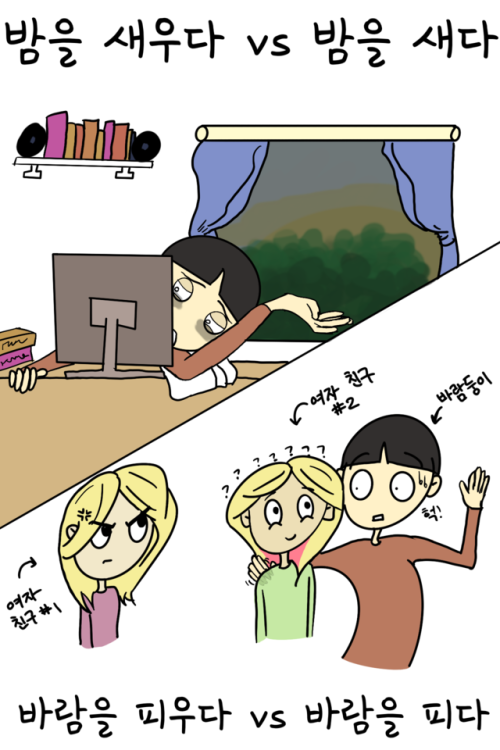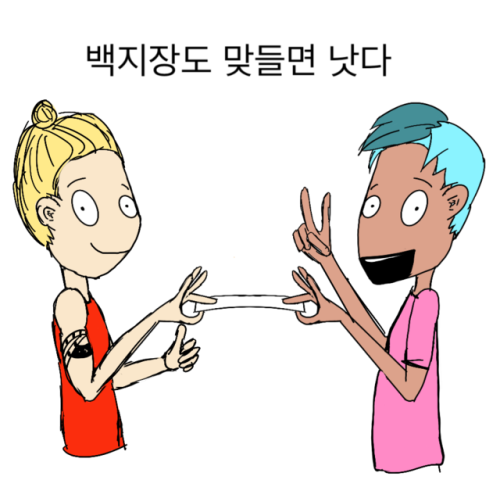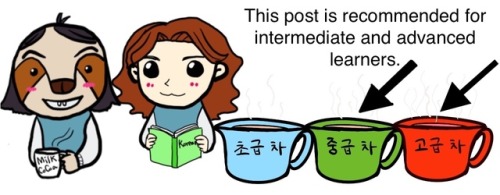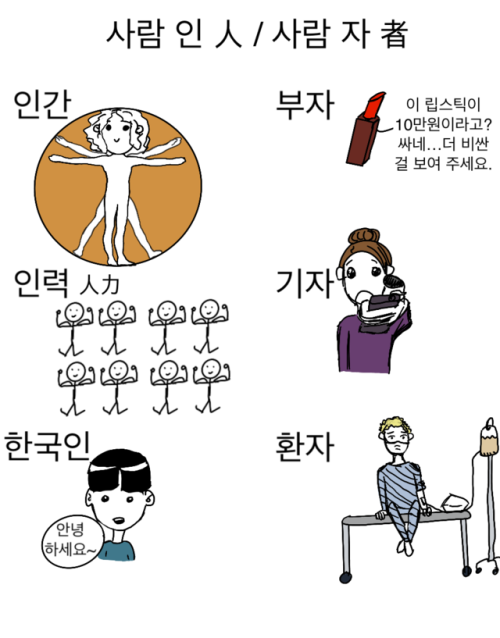#한국어 공부중
Today, I have two beginner grammar points! A/V지만 and V(으)ㄹ래. They are quite simple, but this post ended up being much longer than I thought it would.
지만 is a way to express opposing situations or “but.” It’s simple and to the point.
Luckily verbs and adjectives are conjugated the same way with 지만.
Present tense: All you have to do is remove the dictionary 다 from the verb/adjective and add 지만.
좋아하다
너를 좋아하지만 우리는 사귈 수 없어. I like you, but we can’t date.
먹다
저는 야채를 잘 먹지만 과일을 잘 안 먹어요. I eat vegetables well (often, a lot), but I don’t eat fruit well (often, a lot).
좋다
이 신발이 좋지만 너무 비싸요. These shoes are good, but they’re too expensive.
나쁘다
그 남자는 성격이 나쁘지만 잘 생겼어요. That guy’s personality is bad, but he’s handsome.
And, it can be used with nouns as well in the form of (이)지만.
Nouns that end in a consonant get followed by 이지만 (ex: 선생님이지만), and nouns that end in a vowel get followed by 지만 (ex: 실례지만).
저는 선생님이지만 어렸을 때 학교 가기 싫었어요. I’m a teacher, but I hated going to school when I was young.
그 사람은 우리 오빠지만 우리는 안 닮았어요. That person is my older brother, but we don’t look alike.
저는 학생이 아니지만 어려 보여서 학생 할인을 받았어요. I’m not a student, but I got the student discount because I look young.
지만 can also be used with the past tense. All you do is add 지만 to the past 았/었/였.
좋아했지만 // 먹었지만 // 좋았지만 // 나빴지만 // 학생이었지만 // 오빠였지만
It can be used with other grammatical constructions as well, but I’ll leave them out to keep this beginner.
———————————————————————————————————
V(으)ㄹ래 is also a rather simple grammar point. When I learned (으)ㄹ래, the book taught it as another future tense “will.” And because of that, I confused it with the other future tenses like (으)ㄹ 거예요 and (으)ㄹ게요. But, luckily they are all quite different from each other in usage. V(으)ㄹ래요 is used when someones will or want is involved. It’s a very strong way to say “I will” do something or “want to” do something.
For example:
A 집에 가서 공부 할 거예요. I will go home and study.
B 집에 가서 공부할래요. I will go home and study.
These two sentences are actually very different. The first sentence (A) just states that you’re going to go home and study, it doesn’t necessarily mean that you want to study at home. It’s just something that will happen. But the second sentence (B) means that this is what you want to do. You want to study at home. It can emphasize that you want to do the action (studying), or it can emphasize that you want to do the action specifically at your house. And probably not where you are now.
Let’s look at another example.
A 나랑 같이 갈 거야? Are you going with me?
B 나랑 같이 갈래? Will you go with me? (Want to go with me?)
These are also very different. Sentence A can be used to ask for information. “Are you going with me?…or with someone else? or…?” But sentence B asks about that persons will. “Will you go with me?/Do you want to go with me?”
Let’s look at some more examples of (으)ㄹ래.
으으…소개팅 하기 싫어. 안 갈래. uhh…I don’t want to have a blind date. I’m not going./I won’t go.
여기 좀 시끄러워서 도서관에 가서 공부할래요. This place is a bit loud, so I’ll go to the library and study.
뭐를 먹을래(요)? What do you want to eat? (informal) 뭐를 드실래요? What do you want to eat? (Formal/respectful)
난 절대 결혼하지 않을래. I will never get married.
너가 가. 난 여기 있을래. You go. I’ll stay here. (I want to stay here./I’m going to stay here.)
note: (으)ㄹ게 also means “I will,” but it’s mostly used when making promises or saying “I will” do something for someone else (favors, promises etc).
A: 문닫아야 겠어. 추워. I better shut the window. It’s cold.
B: 앗 내가 닫아 줄게. Ah, I’ll shut it (for you).
If I say, 내가 닫을래/닫아 줄래 (I will shut it/I will shut it for you), it sounds like I’m saying “Don’t close it, I want to be the one to close it!” In that sense (으)ㄹ래 is the strongest “will” among the three. To organize it quickly in a simple guide for beginners:
(으)ㄹ 거야/거예요 - general information about the probable future
(으)ㄹ게(요) - will do something for someone else
(으)ㄹ래(요) - will do something because I want to do it
This might be more confusing than it should be. So, please leave any messages if something needs clarification. And, I good luck studying everyone!
I hope you all had a good weekend! Follow me if you want to keep seeing more Korean posts.^^
Post link
Hi guys~ I made a tea rating system for my posts so that you can know right away what level you’re going to be reading. I hope it’s useful. Today, I’m going to be talking about introducing yourself in Korean for both beginners and intermediate Korean learners. So, I’ll start by saying hi.

Thankfully, introducing yourself in Korean is pretty easy. Beginners can use a basic 안녕하세요? (Hello) and then your name +이에요/예요.
And the difference between 이에요 and 예요 is easy.
이에요 is used if your name ends in a consonant sound(ㄱㄴㄷㄹㅁㅂㅅㅇㅈㅊㅋㅌㅍㅎ) and 예요 is used after a vowel sound (ㅏㅓㅗㅜㅡㅣㅐㅔㅚㅟㅢㅑㅕㅛㅠㅒㅖㅘㅝㅙㅞ).
Here are some examples and ways to introduce yourself.
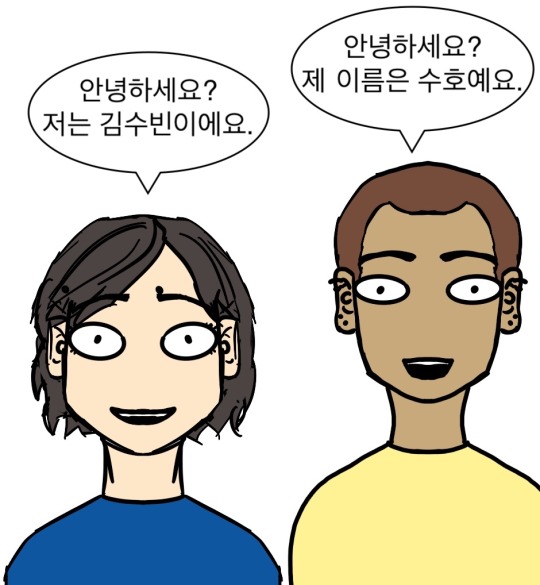
안녕하세요? 저는 김수빈이에요. Hello, I’m Subin Kim.
*수빈 ends with the consonant ㄴ, so 이에요 must be used.
안녕하세요? 저는 수호예요. Hello, I’m Suho.
*수호 ends with the vowel ㅗ, so 예요 must be used.
Or, you can use the words 제 이름 (my name) like in the picture above.
안녕하세요? 제 이름은 김수빈이에요. Hello, my name is Subin Kim.
안녕하세요? 제 이름은 수호예요. Hello, my name is Suho.
입니다 is used in formal speeches or maybe at a company, or sometimes between men. (Women don’t use it as often in informal situations). You might see it often on the news or when idols introduce themselves on TV shows.
For example:
안녕하세요? 저는 유키입니다. Hello, my name is Yuki.
Or you can use the more advanced phrase (이)라고 하다 (I am called).
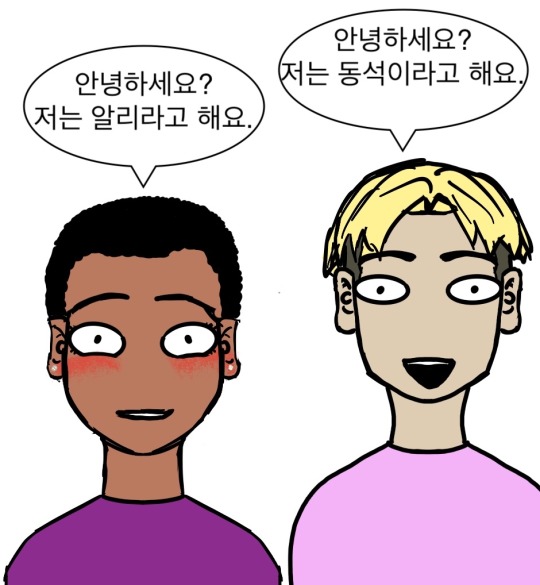
안녕하세요? 저는 알리라고 해요. Hello, I’m called Allie.
*알리 ends in the vowel ㅣ, so 라고 하다 is used.
안녕하세요? 저는 동석이라고 해요. Hello, I’m called Dongseok.
*동석 ends in the consonant ㄱ, so 이라고 하다 is used.
As with the first introductions, 라고 하다 is attached to names that end in a vowel, and 이라고 하다 is attached to names that end in a consonant.
“I’m called NAME” might sound a little awkward in English, but it’s a really common way to introduce yourself. *The phrase “name(이)라고 부르다(불러요)” is taught in some books, but is not a common introduction. You might use it to say: My name is Thomas, but please call me Tom. 제 이름은 토마스지만 톰이라고 불러 주세요.*
For school clubs or slightly more formal introductions, it’s common to use the formal version of (이)라고 하다, which is (이)라고 합니다. It’s used often if you’re introducing yourself in front of many people at one time like when joining a school club or being forced to introduce yourself to a class.
For example:
안녕하세요? 저는 제임스라고 합니다. Hello, I’m called James.
And now you might be wondering about an informal way to introduce yourself. Well, I’ve got you covered. You can say 안녕 (informal hi) and then you can add 이야 to the end of your name if it ends with a consonant and 야 to the end of your name if it ends in a vowel.
Or you can use the intimate speech level with (이)라고 하다, which is (이)라고 해.
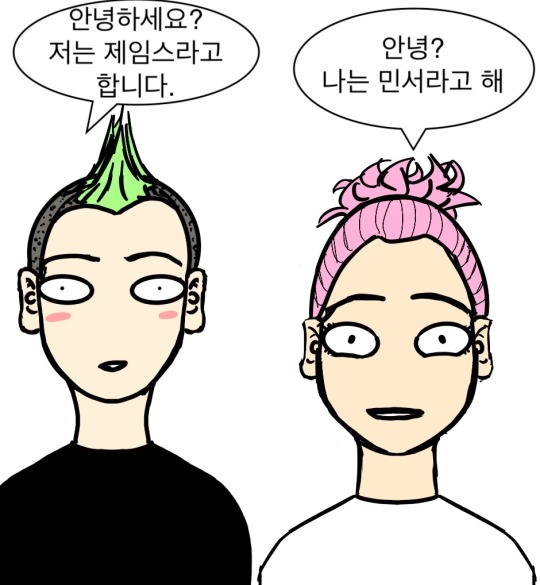
For example:
안녕? 나는 수호야. Hi, I’m Suho.
안녕? 나는 동석이야. Hi, I’m Dongseok.
안녕? 내 이름은 알리야. Hi, I’m Allie.
안녕? 나는 민서라고 해. Hi, I’m called Minseo.
But, honestly, unless you were meeting a child, you probably wouldn’t introduce yourself this way. And even then, the child wouldn’t use your name, so you might not even say it. Even though it’s common to use informal speech (반말) to people younger than you, most people start talking in formal speech because it is polite, and you’re not close yet.
But people who meet in elementary to high school might greet this way, because they know their classmates are the same age as they are. So, you’ll see this informal introduction in high school dramas or webtoons.
And if you’ve read to this point, you’re probably thinking all this is great, but there are so many options. What one do I use? So, here’s my personal opinion. I think the best two options on this list are 저는 ㅇㅇ예요/ㅇㅇ이에요 for beginners and 저는 ㅇㅇ(이)라고 해요 for anyone. The first one is simple and absolutely acceptable, and the second one, while being extremely common, sounds a bit more advanced and natural. So, you can show off your skills a bit. And if you’re introducing yourself in front of a class or something, 저는 ㅇㅇ(이)라고 합니다 is a great choice.
If you have any questions, leave a comment.
And follow me for useful Korean lessons and tips!^^
Post link
This is a post I made when I first started this blog, but I thought I’d bring it back since it’s a really great word. 부지런하다 is a word that you hear quite often in Korea. It normally translates to diligent or hard working.
It’s used all the time as a response to hearing that you’re doing something that’s good for your mind or body.
So, if you wake up early to exercise or study instead of watching Netflix, you’re probably going to hear the phrase: 부지런하네요~
Here are two examples.
오늘 아침에 일찍 일어나서 운동했어요. I woke up early and exercised this morning.
우와 정말 부지런하네요. Wow, you really work hard./You’re really diligent.
우리 오빠는 숙제를 미리 하는 편이에요. 저보다 부지런하죠?ㅋㅋ My older brother always does his homework in advance. He works a lot harder than I do, huh? Haha
It’s basically used to praise someone for something that most people are too lazy to do or don’t like doing. It’s a great word. After learning this phrase, I realized why my Korean friends used the word “diligent” so often.
Anyway, as always! Follow me for more Korean language posts.
Post link
Today I have another 속담(proverb/old saying). 산 넘어 산이다.
This one is one of my favorites. Life is full of challenges one after another. And this proverb illustrates just that feeling.
So, let’s first break 산 넘어 산이다 down. 산 means mountain(s), 넘다 means to climb over, pass, cross, and 산이다 is 산(mountain) plus the copula 이다 (similar to “to be”).
산 넘어 산이다. Literally means something like “there is (another) mountain after going over a mountain.”/ “Go over the mountain and there is another mountain.”
It’s used to express discontent that there is “one problem/challenge after another.” Once you finish one challenge, another one appears.
So, like the pictures, American college students are in a debt crisis. So, it’s probably pretty relatable for some of you. I just struggled to get through college! So, now I should be okay. But, the moment I finish my first challenge (getting through college), I’m immediately faced with another challenge (paying off college debt).
With life always putting new problems, barriers and challenges in front of us, this is a great expression. Here are some examples.
산 넘어 산이라고 대학교를 졸업하자마자 학비를 갚아야 돼요. “It’s just one challenge after another.” As soon as I graduate, I have to repay my school costs.
인생은 쉽지는 않지. 산 넘어 산이라고 하잖아. Live isn’t easy. They say it’s one hardship after another you know.
A: 민경아, 취직했다면서? 축하해! Mingyeong. I heard you got a job? Congratulations!
B: ㅋㅋ 고마워..취직을 하긴 했는데 다음 주 영어 시험을 봐야 된대. 산 넘어 산이야. haha Thank you…I did get a job, but they said I have to take an English exam next week. It’s just one thing after another.
Let me know if you have any questions. Good luck studying everyone! I hope you don’t have too many mountains to cross while studying Korean!
Post link
Hey guys, today I have two interesting verbs for you.
새우다 and 피우다. The reason they are interesting is that you often don’t see them in their “correct” form while talking. Some of you might have even noticed this or wondered why you don’t see 새우다 and 피우다 often or if there is a difference.
In textbooks you’ll learn sentences like:
어제 밤을 새워서 공부했어요. I stayed up all night studying yesterday.
But, you don’t hear that sentence too often in real life conversations with friends. Instead, you hear this:
어제 밤을 새서 공부했어요. I stayed up all night studying.
Or
밤을 샜어요. I stayed up all night./I pulled an all-nighter.
In class, newspapers, and in the dictionary, you will (or should) find the verb as 새우다. But, most people (at least in Seoul) use the verb as 새다. 우 completely disappears. 피우다 is the same. In the dictionary and in your books, you’ll see 담배(를) 피우다 and 바람(을) 피우다. But, many people say 담배(를) 피다 and 바람(을) 피다.
밤을 새다 is technically incorrect. But, you’ll hear it more often than the correct version. It’s kind of like “who and whom” in the US. Most people don’t use “whom” at all. They use “who” incorrectly even if they know it’s wrong. That’s because for some weird reason using “who” wrong sounds more natural than using “whom” correctly.
Here are a few examples of the three most common words I’ve come across.
담배를 안 폈으면 좋겠어요. (*안 피웠으면) I wish you didn’t smoke cigarettes.
밤을 새지 마. 숙제는 내일 해. (*새우지 마) Don’t stay up all night. Do your homework tomorrow.
남자 친구가 바람을 피면 끝이야! (*바람을 피우면) If (my) boyfriend cheats, it’s over/it’s the end.
It’s strange that language sometimes sounds better when it’s wrong, right? Just one more reason to not stress about speaking “perfect Korean.” You should use the correct form when writing papers and on tests, but when you’re talking or texting, feel free to use it “incorrectly.”
Anyway, good luck studying guys!
Post link
Hi guys, today I have a little 말장난 (pun, word play) for you.
In the picture, the guy in green says “석준아, 내 말 좀 들어 줘!” and then gives 석준 a horse. This is a common 짤 (meme) that you can find in google images for Korean puns.
말 means both “words” or “horse.” And the phrase 들어 주다 can mean “to listen to someone” or “to hold something for someone.” (듣다 to listen/들다 to hold something)
So, “내 말 좀 들어 줘” could be translated two different ways. “Please listen to what I have to say” or “please hold my horse.”
But, you know…you will probably never say “please hold my horse.” (unless it’s a toy horse?)
Either way, I recommend looking up the 짤. You can save it and send it to a Korean friend when you want to tell them something.
Anyway, good luck studying everyone~!
Post link


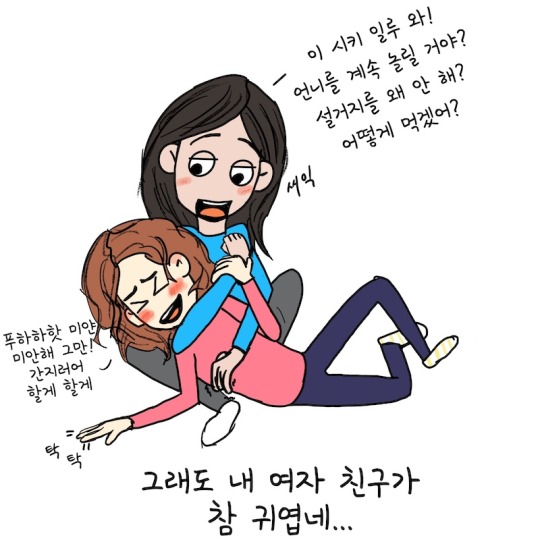
Hey guys! I know it’s been a really long time since I posted anything. I thought I’d have so much time this summer to work on my blog, and things just haven’t turned out that way. While on vacation, my girlfriend and I suddenly found out we had to prepare for her visa interview 3 weeks earlier than it was scheduled. We’re actually engaged. Unfortunately, we can’t get married here, so we are preparing to go the US together. It’s been quite a process. And therefore, I have been preparing to go home. And my room even had water pouring through the ceiling at one point. It’s been a really long month haha.
But I’m happy to say that everything turned out well. And I have a little comic of my girlfriend and me. I thought it might be some good reading practice. It’s written really naturally at the upper-intermediate level. I hope you like it! (It’s based on a true story…I hate doing dishes.) If you guys like it, I will post more. They’re fun to draw for me.
It also fits in great since it’s Pride month! Although, it’s slightly late. Happy Pride everyone!
Here is a translation of the comic.

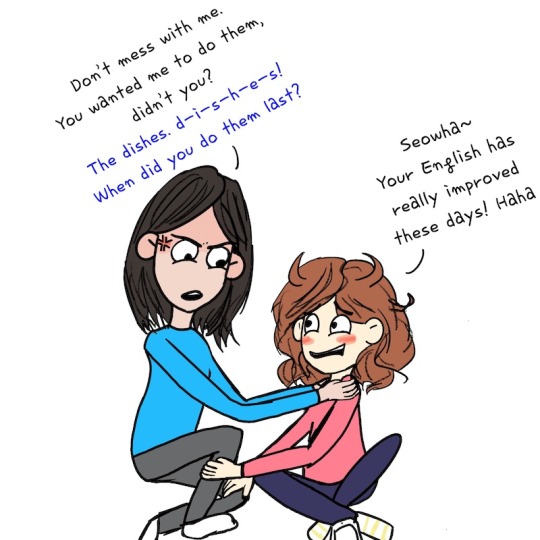

Notes:
시키* is a much cuter and softer version of the curse word 새끼 (bastard). It’s something we use with each other, but I don’t use it with anyone else. Swear words should always be used with caution. ^^
*간지러 is used instead of 간지러워 (간지럽다 to be itchy, ticklish). Sometimes words ending in “럽다” are shortened like this, especially the faster you want to get the words out. It’s technically incorrect, but you’ll hear it. For example, sometimes you hear 시끄러! instead of 시끄러워 (시끄럽다 to be loud, noisy).
Anyway, I hope everyone is having a good summer so far!
Hi guys~ today’s post is a Korean 속담 (proverb, old saying).
백지장도 맞들면 낫다.
First, let’s break it down.
백지장 white paper / 도 also, too / 맞들다 to lift up something together / (으)면 “if/when” grammar / 낫다 to be better
You could literally translate it as “It’s better if you lift up even a sheet of paper together.”/ “If you lift up a white sheet of paper together, it’s better.”
It’s similar to “many hands make light work” or “two heads are better than one.”
A piece of paper is incredibly light, but even something that light is easier to lift if two people do it together. So, this is an expression about working together to make a task easier. Here are some examples of how to use it.
(If someone is telling you you don’t have to help) 아냐 아냐 나도 도와줄게. 백지장도 맞들면 낫잖아! No, no. I’ll help you (too). Many hands make light work, you know.
백지장도 맞들면 낫다고 제가 도와드릴게요. They say many hands make light work; I’ll help you.
왜 혼자서 하려고 그래? 백지장도 맞들면 낫다는 말도 있잖아. 같이 하자. Why are you trying to do it yourself? They say many hands make light work. (Lit: You know there is an expression/words “many hands make light work.”) Let’s do it together.
Good luck studying guys!
Post link
Hi guys~ I’ve mentioned before that learning hanja is a great way to expand your vocabulary and also to understand vocabulary on a deeper level. Today, I have two different hanja that are used to represent the word “사람” or “person.”
The first one is 사람 인 人.
인간 human / 타인 other person, stranger / 성인 (adult person) adult
인재 talented person (재 for 소질 talent, aptitude for / 재능 talent)
한국인 Korean (person) / 외국인 foreign person / 인구 (인 person, 구 mouth - like the number of mouths to feed) population / 애인 (애 love, 인 person) lover, boy/girlfriend
If you remember learning 힘 력 力 (power), then you can use that to understand the word 인력 人力 (manpower). It’s often seen in the work force as 인력 필요하다 to need people to work/manpower.
There is also 사람 자 者.
부자 rich person *So in the picture with the lipstick, the person says “이 립스틱이 십만원이라고? 싸네…더 비싼 걸 보여 주세요. This lipstick is 100,000 won? (about 100 US dollars) That’s cheap…please show me a more expensive one.
환자 patient / 소비자 consumer / 피해자 victim / 노동자 (노동 labor 자 person) laborer
희생자 victim (“희생 sacrifice 자 person”) / 기자 newspaper journalist
약자 weak person (typically used to refer to women, children, and the elderly)
범죄자 (crime person) criminal / (비)흡연자 (non)smoker (lit: (비 not) 흡 taking in/drinking 연 smoke 자 person)
Don’t worry about the difference between 사람 인 and 사람 자. These are just the hanja that appear in vocabulary words. There is no “difference,” but you cannot change them. It’s impossible to change 한국인 to 한국자. You have to use 한국인.
Good luck studying everyone! Follow me for more Korean lessons.
Post link


(으)면 좋겠다 is a power grammar point. It’s at the (lower) intermediate level, but it’s used all the time. It’s a core grammar point in my opinion, and you definitely need to master it.
(으)면 좋겠다 is attached to both verbs and adjectives to express one’s wishes or hopes. Many beginner students try to say “I wish/hope” by translating the word to 소원을 빌다/희망하다/바라다 or the grammar point -기를 바라다. And while they aren’t exactly wrong, it’s really easy to use them awkwardly or incorrectly in everyday situations.
And that’s why, I’d like to introduce (으)면 좋겠다. It uses (으)면 “if” and 좋겠다 “would be nice” to mean “I wish” or “I hope,” even though “wish” and “hope” aren’t always interchangeable in English. This grammar point can be used to express both. It literally expresses “I would be nice if…” One of the interesting parts of this grammar point is that context is super important when translating it. It can be used in a lot of situations unlike the English words “wish” or “hope” which have more distinguished differences.
And if you already learned (으)면 “if/when,” then you already know how to conjugate it! Words ending with a consonant use -으면 좋겠다, and words ending with no consonant use -면 좋겠다.
Verbs/Adjectives
하다 —> 하면 좋겠다 vs. 먹다 —> 먹으면 좋겠다
크다 —> 크면 좋겠다 vs. 없다 —> 없으면 좋겠다
Here are some examples.
내일 시험을 잘 보면 좋겠어요. I hope I do well on the test tomorrow. (시험을 잘 보다 - to take a test well, do well on a test)
전 여자 친구가 앞으로 나랑 연락을 안 하면 좋겠어. I hope my ex-girlfriend doesn’t contact me anymore.
둘이 항상 싸우더라고…헤어지면 좋겠어 Those two always fight…I wish they’d break up.
오늘 비가 오면 좋겠어요. I hope it rains today./It’d be nice if it rains today.
It’s also common to see this grammar used in the past tense, 았/었/였으면 좋겠다. I would actually argue that it’s more common to see it in the past tense (in my experience that is). Luckily, its core meaning doesn’t change. Textbooks are a bit hazy on the difference between the two. But some books say it’s just a little bit stronger. Think of it as a little more emphasis on your wish. (Just remember that this form is used a bit more. And the difference is really arbitrary in regards to its usage.)
너는…그런 말을 안 했으면 좋겠어. 너는 예쁘잖아. I wish you wouldn’t say that (words like that). You’re pretty…
A 아이돌이 나랑 사랑에 빠졌으면 좋겠다~ I wish idol A would fall in love with me.
내 생일 파티에 왔으면 좋겠어요. I hope you come to my birthday party./I wish you would come to my birthday party./It’d be great if you came to my birthday party.
좋은 대학교에 합격했으면 좋겠어. I hope I get accepted into a good school.
걔가 좀 조용했으면 좋겠어. I wish he would be quiet. (*note: this is not a nice thing to say~^^)
It can also be used with the copula 이다 and 아니다.
올해 우리 선생님이 남자였으면(남자면) 좋겠어. I hope our teacher is a man this year.
올해 우리 선생님이 남자가 아니었으면(아니면) 좋겠어. I hope our teacher isn’t a man this year.
You can also use (으)면 하다 instead of (으)면 좋겠다. (으)면 하다 tends to be used more often in formal speech. But the meaning remains the same.
*Note: (으)면 하다 can be used in casual speech, but (으)면 좋겠다 isn’t really used in formal speech.
여러분, 이 발표를 재미있게 보셨으면 합니다. Everyone, I hope you all enjoy this powerpoint.
주연 씨는 좀 더 일찍 수업에 오셨으면 해요. Miss Juyeon, I wish you would come to class a little bit earlier.
(이웃에게) 죄송한데요. 저희 아들이 강아지 털 알레르기가 있거든요. 그래서 강아지랑 놀지 않았으면 해요. (To a neighbor) I’m sorry. You see, our son has a dog fur allergy. So, I hope he doesn’t play with the dog. (And in context, that would equal~ I hope you don’t let him play with the dog.)
Let me know if you have any questions.
Good luck studying everyone! Follow me for more lessons and tips~
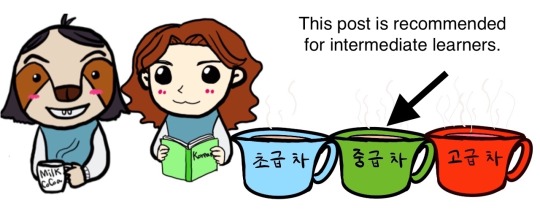
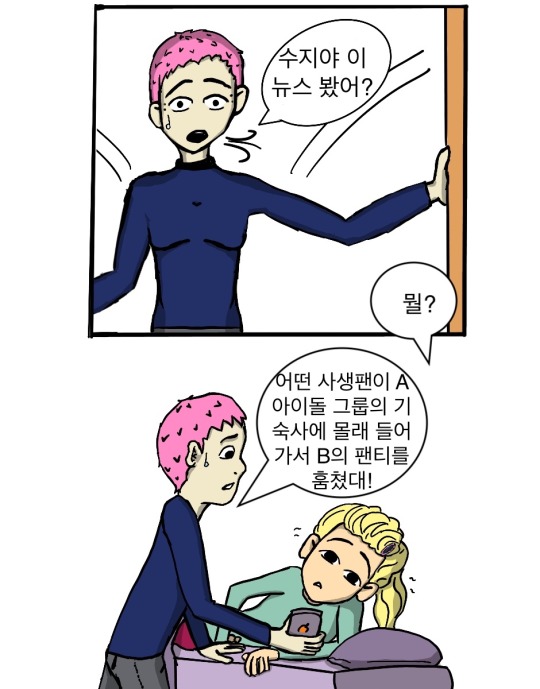

Translation:
수지야 이 뉴스 봤어? Suzie, did you see this (news)?
뭘? What?
어떤 사생팬이 A 아이돌 그룹의 기숙사에 몰래 들어가서 B의 팬티를 훔쳤대! Some stalker fan snuck into A idol’s dorm and stole B’s underwear.
미친…제정신이 아닌가 봐. No f**king way…they’re out of their mind.
Notes
*사생팬
사생(활) is one’s private life. And 팬 is the English loan word for “fan” of an artist or something. Together 사생팬 describes a fan that invades the private life of a star or artist (often to an unbelievable degree) (사생팬: 유명한 사람의 사생활을 침해하는 팬). And with Kpop as crazy as it can be, sometimes fans do unacceptable things like sneaking into a famous celebrities house or stalking them. They can be described as a 사생팬.
*훔쳤대 Someone said someone stole (something)/I heard that someone stole (something)
(V-ㄴ/는대(요) or A-대(요)) is the contracted form of ㄴ/는다고 해(요) and 다고 해(요). This grammar point is for conveying speech that one heard from someone else.
For example:
My mom says it’s okay. 엄마는 괜찮대. (엄마는 괜찮다고 해/했어.)
My sister says she isn’t going. 언니는 안 간대요. (언니는 안 간다고 해요/했어요.)
This contracted form is used all the time in casual speech since it’s shorter. It can be used in the past tense 댔어(요), but it’s used in the present more often. It’s the difference between “My mom says it’s okay” and “My mom said it’s okay.” There really isn’t a huge difference in the message you want to convey.
*팬티
The English loan word panty (팬티) can be used for anyone’s underwear regardless of age or gender. I don’t know about other countries, but I had never heard panty used for underwear that wasn’t for adult women. So, I was a little surprised when I first heard it used for men’s underwear.
*미친
미치다 means to be crazy. And 미친 can be used as an abbreviated way to say that’s crazy/insane or respond to something like “no f–ing way” or “holy shit.” (미쳤다, 미친 사건, 미친 새끼) I’m not quite sure how this abbreviated form came to be, but it’s really common. *I would also like to mention here that 미치다 “to be crazy” is quite a bit more negative in Korean than it is in English. It’s used a lot more often as a curse. It’s can be used lightly among friends, but you should be quite close, as the nuance or intonation could hurt someone’s feelings.
*제정신
제정신 is one’s “right mind.” So, 제정신 아니다 would mean “to not be in one’s right mind.” So, if someone does something that’s kind of crazy or unacceptable, you might be able to use this word. 그 사람이 경찰 앞에서 물건을 훔쳤다고요? 제정신이 아닌가 봐요. (You’re saying) that person stole something right in front of the cops? They’re out of their mind.
I hope you enjoyed this post. Let me know if you have any questions!
It’s been a while since my last post, but I’m going to get back into the rhythm of things!
Follow me for more lessons.^^


